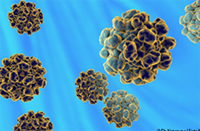Hepatitis E: Infection from raw meat

Though Hepatitis E is considered an exotic disease, more and more people in Germany have recently been infected with it. Prof. Dr. Robert Thimme explains the role raw pork plays and how people can protect themselves.
Hepatitis E, an inflammation of the liver, is triggered by the Hepatitis E virus (HEV). And while the pathogen is more common in certain regions of Asia and Africa, an increasing number of people in Germany have recently been diagnosed with the virus. The consumption of raw pork can often lead to HEV, and foods such as Mettwurst (a type of German sausage made from raw minced pork), salami, or Teewurst (a German “tea sausage“), have been known to contain HEV.
“Many people infected will simply not notice it because they do not present any symptoms,“ says Professor Dr. Thimme, medical director of the Department of Gastroenterology, Hepatology, Endocrinology, and Infectious Diseases at the Medical Center - University of Freiburg. If patients present symptoms, they typically include fatigue, fever or jaundice. “In order to determine whether patients have the Hepatitis E virus, we examine the blood for HEV antibodies. In special cases, we search directly for the virus by using a technique called polymerase chain reaction,“ says Professor Thimme.
Since the disease heals on its own in most cases, specific anti-viral treatments are usually not required. However, the Hepatitis E virus poses a higher risk for pregnant women and patients with chronic liver diseases, which can lead to the disease progressing at a rapid rate. People with a weak immune system, for example patients undergoing chemotherapy or organ transplant recipients being treated with immunosuppressive drugs, can contract a chronic HEV infection and subsequent liver inflammation. In such rare cases, a chronic HEV infection can usually be healed by either reducing the dosage of immunosuppressive drugs or by administering ribavirin. “For these types of patients, it is important to take raised liver function readings seriously and make sure there is no chronic HEV infection,“ advises Professor Thimme. People at risk of contracting Hepatitis E should avoid raw pork, wild game, offal, Mettwurst and raw sausage.
The virus can be transmitted via untreated water, raw foods, and direct skin contact. “People travelling in higher-risk regions should only eat foods that have been peeled or cooked properly, i.e. the food has been heated to at least 70 degrees Celsius to kill any virus present,“ says Professor Thimme. Only use properly bottled water for drinking and brushing your teeth, and avoid ice cubes. Finally, Professor Thimme emphasizes “wash your hands before every meal so as to protect yourself from lurking pathogens“.
Back